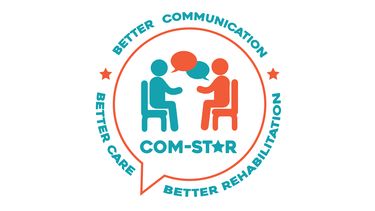The COM-STAR project
A multidisciplinary research programme to change the way stroke survivors with communication impairments are included in care and rehabilitation.

About
The COMmunicating in STroke cAre and Rehabilitation (COM-STAR) research programme aims to understand the key communication training needs of stroke care staff working with NHS patients.
Funded by the NIHR Health and Social Care Delivery Research (HSDR) Programme Grant, the three-year programme will then develop and test training to improve the communication abilities of these staff with patients, to increase patient and staff satisfaction levels in services. This will ultimately better support inclusion, and access to services, for the two-thirds of stroke patients in the UK who have communication impairments.
The research consists of three work packages:
Package 1
Beginning in June 2024, the first stage will include a survey of UK stroke staff about their current communication training; barriers to getting trained or using the communication skills learned; and other factors that help. The first year also involves interviews with stroke survivors with communication impairments, family members, and staff to understand their experiences of communicating in hospital and community services and reviewing the existing research literature to understand what has already been done in staff training.
Package 2
All the findings from the first year of COM-STAR are integrated and will inform the context for the second year which uses the Experience-Based Co-Design (EBCD) process to develop a new communication skills training programme for staff and resources to support communication. This collaborative process involves a series of workshops with stakeholders including NHS stroke staff, service managers, policymakers, and stroke survivors with communication impairments and their families. Uniquely, COM-STAR will run this process in parallel across two sites in Sheffield and London, providing opportunities for a range of stakeholders to be involved.
Some workshops will be attended by e-learning for health partners, NHS England-Technology Enhanced Learning, to help iteratively design and build what the team anticipate is likely to be a standardised digital communication training package for stroke staff.
Package 3
The third stage of the research will be a full evaluation of the work conducted at four NHS trusts - two in the North of England and two in the South - including the implementation, feasibility, acceptability, outcomes and impact of the training package with stroke staff, patients, and family members.
Survivors and staff discuss their experiences
As part of the COMSTAR project we have produced two short films.
How stroke survivors with communication difficulties experience care
Our survivor and carer film features people with different communication disorders acquired from the stroke and their relatives. They talk about their experience of how communication difficulties affect their care and what staff can do to communicate better.
Staff experiences of caring for stroke survivors with communication difficulties
Our staff film features doctors, nurses, allied health professionals, rehabilitation assistants and housekeepers working in hospital and community settings. They describe their feelings and concerns about working with patients with communication difficulties, some things they try to help communicate better, and the communication training needs they have.
Thanks to everyone who agreed to share their experiences, and to the COMSTAR PPI group for helping to select clips for the stroke survivor film and make it as accessible as possible.
Give us your feedback
Please feel free to use these films to raise awareness or to include in presentations, teaching, training etc. We would be grateful if you would let us know if you have used these films for any staff training/development, (formal or informal) or have incorporated any of the insights and learning into your clinical practice.
Our team
Rebecca Palmer, Professor of Stroke Communication & Rehabilitation at Sheffield, and Madeline Cruice, Professor of Aphasia Rehabilitation and Recovery at City, jointly lead the programme.
They are working in collaboration with colleagues at
- University of Sheffield
- City St George's, University of London
- Sheffield Teaching Hospitals NHS Foundation Trust
- Glasgow Caledonian University
- University of Central Lancashire
- University College London (UCL)
- University of Nottingham
- University of Southern Denmark
- University of Technology Sydney (UTS)
Patient and public involvement (PPI) group
Information for professionals
Join our mailing list
If you want to receive quarterly updates about the project and learn about opportunities to get involved, see below to sign up for our mailing list.
Shape the future of stroke care communication training — SURVEY NOW CLOSED
Thank you to all health or social care professionals, health care/rehabilitation assistants, or domestic/housekeepers working in stroke care in the UK, who completed the survey between June and September 2024. The survey is now closed.
Your thoughts will help us to understand what is currently available in communication skills training for staff, and what is needed. By taking part in our survey, you have directly contributed to shaping training programmes that enhance communication with stroke patients, ultimately improving their care and rehabilitation experiences and outcomes. Thank you for your time, effort and input.
Highlights from the survey findings will be shared on the website and on the next newsletter.
Our prize draw winners have been contacted and they will each receive one of four £50 shopping vouchers.
Launch video
Newsletters
Opportunities to get involved
If you are interested in taking part or have any questions, contact the team at comstar@sheffield.ac.uk.
Contact us
If you want to receive quarterly updates on the project and learn about opportunities to get involved, you can join our mailing list.
You can also contact us at comstar@sheffield.ac.uk













